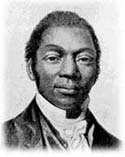Yale Abolitionists
Yale
Abolitionists
Samuel Hopkins
James Hillhouse
Simeon Jocelyn
The Amistad Affair
James Pennington
Charles Torrey
Cassius Clay
1856 Kansas Meeting
|
James Pennington
 Kurt
Schmoke, the current Sr. Fellow of the Yale Corporation, in a 1971 article
based on his Yale senior essay, described the efforts from 1834-38 of
James Pennington, the first black pastor of New Haven's Dixwell Avenue
church, to get a Yale education so he could receive a ministerial license: Kurt
Schmoke, the current Sr. Fellow of the Yale Corporation, in a 1971 article
based on his Yale senior essay, described the efforts from 1834-38 of
James Pennington, the first black pastor of New Haven's Dixwell Avenue
church, to get a Yale education so he could receive a ministerial license:
Yale refused to allow
Pennington to enroll in the seminary and even prohibited him from
withdrawing books from the library. They did, however, accede to his
desire to audit courses, and for four years Reverend Pennington worked
with these handicaps to attain the educational requirements for licensing
as a Congregational minister (137).
James Pennington had escaped
from slavery in Maryland in 1827. He headed north as a fugitive, and
in 1831 was a delegate to the first annual "Convention of Free Coloured
Persons," the same convention that had approved Simeon
Jocelyn's vision of the "Negro college." He later published his
own life as a slave narrative-The Fugitive Blacksmith-and became
one of America's most renowned anti-slavery spokesmen.
His career as an abolitionist
focused on education, about which he said, "There is one sin that slavery
committed against me, which I can never forgive. It robbed me of my
education; the injury is irreparable" (138).
There is no building on
the Yale campus that honors James Pennington.
|
Numbers in parentheses refer
to notes. See the notes page.
|

 Kurt
Schmoke, the current Sr. Fellow of the Yale Corporation, in a 1971 article
based on his Yale senior essay, described the efforts from 1834-38 of
James Pennington, the first black pastor of New Haven's Dixwell Avenue
church, to get a Yale education so he could receive a ministerial license:
Kurt
Schmoke, the current Sr. Fellow of the Yale Corporation, in a 1971 article
based on his Yale senior essay, described the efforts from 1834-38 of
James Pennington, the first black pastor of New Haven's Dixwell Avenue
church, to get a Yale education so he could receive a ministerial license: